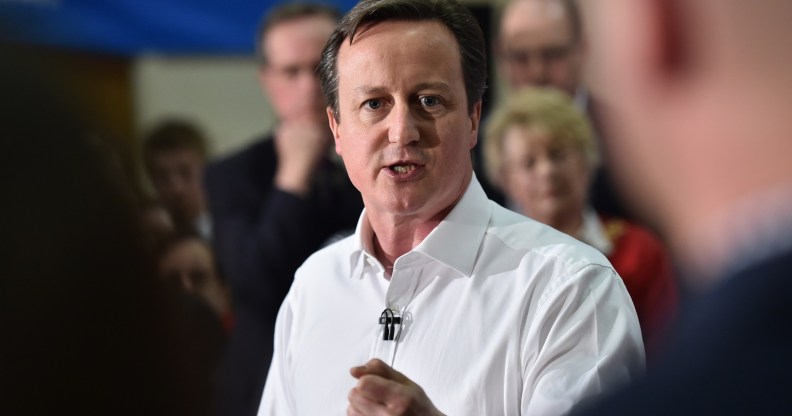PinkNews Editorial: David Cameron will leave behind a proud legacy on LGBT rights

David Cameron, who today announced that he will resign, singled out his pride at introducing same-sex marriage in his list of positive achievements while in office. PinkNews looks back on his journey, from voting against LGBT rights to being one of the LGBT community’s strongest allies.
When first fighting for his seat in Westminster fifteen years ago, a fresh-faced 34-year-old David Cameron opposed the repeal of Section 28, the law that banned the ‘promotion of homosexuality’ in local authority schools, restricting how teachers could tackle gay issues.

Indeed, Cameron was only selected for the safe Tory seat of Witney following the defection of its then-MP Shaun Woodward to Labour over the Conservatives’ opposition to the law’s repeal.
In 2003, Cameron voted to retain Section 28, even as fellow Conservatives Boris Johnson and George Osborne rebelled against leader Iain Duncan Smith to help repeal the law.
During his early years as an MP, Cameron voted against allowing gay couples to jointly adopt children, though he did vote in favour of civil partnerships in 2004.
By the time he ran to be Conservative Party leader in 2005, he was beginning to advocate a different approach to LGBT rights.
At his first party conference speech as party leader, the following year, he said: “There’s something special about marriage. It’s not about religion. It’s not about morality. It’s about commitment […] And by the way, it means something whether you’re a man and a woman, a woman and a woman or a man and another man.”
However, as Tory leader, he was criticised for pulling his MEPs out of the main centre-right alliance in the European Parliament and instead forming a new grouping with parties including Poland’s anti-gay Law and Justice party.
In the run up to the 2010 general election, Cameron began to brandish his LGBT credentials. Answering questions from PinkNews readers, he said that he was open to changing the law on marriage “to guarantee equality”.
He also committed that if he became Prime Minister, that he would introduce a law to allow people to disregard criminal convictions for historic gay sex offences. This became law in 2012, through the Protection of Freedoms Act.
Opening his Q&A session with PinkNews, Cameron said: “I am aware that there will remain some doubters. But have no fear: the Party has changed, the changes we have made are supported by those serving in my team and those changes are lasting. So far as I am concerned, it [LGBT rights] is one of the touchstone issues that define the modern Conservative Party.”
On his election as Prime Minister, PinkNews published that the coalition of the Liberal Democrats and the Conservatives would provide the best option for improving LGBT rights in the UK. It was this coalition led by Cameron and the then Lib Dem leader Nick Clegg that began the lengthy and controversial process to introduce same-sex marriage in England and Wales. Championed by Home Secretary Theresa May and the then Lib Dem Equalities Minister Lynne Featherstone, the concept quickly gained cross party support, with the then Labour leader Ed Miliband also backing the measure strongly.
In 2011, speaking at the Conservative Party conference, Cameron said: “I stood before a Conservative conference once and I said it shouldn’t matter whether commitment was between a man and a woman, a man and another man or a woman and a woman.
“You applauded me for that. Five years on, we’re consulting on legalising gay marriage.
“And to anyone who has reservations, I say this: Yes, it’s about equality, but it’s also about something else: commitment. Conservatives believe in the ties that bind us; that society is stronger when we make vows to each other and support each other.
“So I don’t support gay marriage in spite of being a Conservative. I support gay marriage because I am a Conservative.”
Over the following two years, Cameron faced significant opposition from within his own party and religious leaders as a result of his decision to back same-sex marriage.

On 5 February 2013, the House of Commons passed its first vote in favour of same-sex marriage, but the majority of Conservative MPs voted against the Prime Minister. Rather than hide the historic nature of the achievement, passed into law later that year, Cameron said that equal marriage was one of his proudest achievements in office.
Writing for PinkNews on the eve of the first same-sex weddings in England and Wales, Cameron said: “For the first time, the couples getting married won’t just include men and women – but men and men; and women and women. After all the campaigning – not least by readers of PinkNews – we will at last have equal marriage in our country. Put simply, in Britain it will no longer matter whether you are straight or gay – the State will recognise your relationship as equal.
“This is something that has been very important to me. I have been so lucky to find the most incredible lifelong partner in Sam and our marriage has been a very special part of the commitment we have made to each other. Of course any marriage takes work, requires patience and understanding, give and take – but what it gives back in terms of love, support, stability and happiness is immeasurable. That is not something that the State should ever deny someone on the basis of their sexuality. When people’s love is divided by law, it is the law that needs to change.
“The introduction of same-sex civil marriage says something about the sort of country we are. It says we are a country that will continue to honour its proud traditions of respect, tolerance and equal worth. It also sends a powerful message to young people growing up who are uncertain about their sexuality. It clearly says ‘you are equal’ whether straight or gay. ”
Aside from same-sex marriage, Cameron campaigned against homophobia and transphobia in sport, raised LGBT rights with world leaders including Russian president Vladimir Putin and secured a historic pardon for Alan Turing.
In a video that he recorded for the 10th birthday of PinkNews, Cameron said: “The battle for equality is not over. There are still too many people denied chances because of who they are and who they love, too many homophobic attacks taking place on our streets, too many countries where to be gay is to be a target of persecution.”
For all his reforms, it was a 2014 interview with Newsnight’s Evan Davis that perhaps showed the completeness of Cameron’s evolution, when the PM was asked how he would feel upon seeing two men kissing in public.
Where past Tory leaders may have demurred, Cameron answered loudly and clearly: “That’s fine! I’ve been very clear about this… if I can kiss my wife in public, I don’t see why you can’t kiss your husband in public.”
David Cameron will be remembered for many things.
For some, his legacy will be offering the referendum that has led to the UK voting to leave the European Union.
Others will remember the austerity imposed in the wake of the economic crash that occurred shortly before taking office. Some will remember his commitment to international development, securing 0.7% of GDP to be offered for foreign aid.
However, PinkNews believes that in the long term, he will be remembered for changing the mould of the Conservatives when it comes to LGBT rights.
Championing equal marriage has changed this country for the better and has done much to create a more equal society. The challenge is ensuring that whoever follows him as Conservative leader shares his vision of a world where there is no discrimination on the grounds of sexuality or gender identity.

